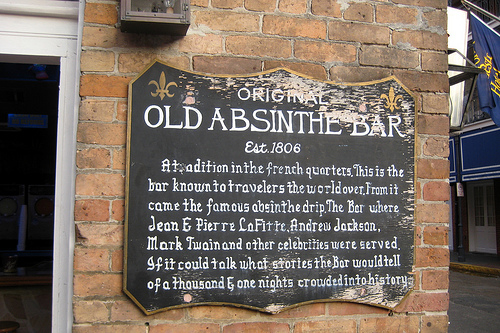Absinthe: The Green Goddess is an essay in 8 parts by the famous occultist Aleister Crowley, first published in The International, Vol XII No.2, February 1918. It seems to have been composed in the legendary Old Absinthe House in New Orleans.

In it he extols the peculiar virtues of this beverage that was often vilified, and became banned in many countries throughout the 20th century. In part VI he writes thus:
Ah! the Green Goddess! What is the fascination that makes her so adorable and so terrible? […] What is there in absinthe that makes it a separate cult? The effects of its abuse are totally distinct from those of other stimulants. Even in ruin and in degradation it remains a thing apart: its victims wear a ghastly aureole all their own, and in their peculiar hell yet gloat with a sinister perversion of pride that they are not as other men.
But we are not to reckon up the uses of a thing by contemplating the wreckage of its abuse. We do not curse the sea because of occasional disasters to our marines, or refuse axes to our woodsmen because we sympathize with Charles the First or Louis the Sixteenth. So therefore as special vices and dangers pertinent to absinthe, so also do graces and virtues that adorn no other liquor.
I have chosen to reproduce the whole part III, devoted to a brilliant description of the prohibitionist, which remains true for any type of bigotry, whether with respect to alcohol and drugs or to unconventional sex:
III.
The Prohibitionist must always be a person of no moral character; for he cannot even conceive of the possibility of a man capable of resisting temptation. Still more, he is so obsessed, like the savage, by the fear of the unknown, that he regards alcohol as a fetish, necessarily alluring and tyrannical.
With this ignorance of human nature goes an ever grosser ignorance of the divine nature. He does not understand that the universe has only one possible purpose; that, the business of life being happily completed by the production of the necessities and luxuries incidental to comfort, the residuum of human energy needs an outlet. The surplus of Will must find issue in the elevation of the individual towards the Godhead; and the method of such elevation is by religion, love, and art. These three things are indissolubly bound up with wine, for they are species of intoxication.
Yet against all these things we find the prohibitionist, logically enough. It is true that he usually pretends to admit religion as a proper pursuit for humanity; but what a religion! He has removed from it every element of ecstasy or even of devotion; in his hands it has become cold, fanatical, cruel, and stupid, a thing merciless and formal, without sympathy or humanity. Love and art he rejects altogether; for him the only meaning of love is a mechanical—hardly even physiological!—process necessary for the perpetuation of the human race. (But why perpetuate it?) Art is for him the parasite and pimp of love. He cannot distinguish between the Apollo Belvedere and the crude bestialities of certain Pompeian frescoes, or between Rabelais and Elenor Glyn.
What then is his ideal of human life? one cannot say. So crass a creature can have no true ideal. There have been ascetic philosophers; but the prohibitionist would be as offended by their doctrine as by ours, which, indeed, are not so dissimilar as appears. Wage-slavery and boredom seem to complete his outlook on the world.
There are species which survive because of the feeling of disgust inspired by them: one is reluctant to set the heel firmly upon them, however thick may be one’s boots. But when they are recognized as utterly noxious to humanity—the more so that they ape its form—then courage must be found, or, rather, nausea must be swallowed. May God send us a Saint George!
Source of the text: Ra-Hoor-Khuit Network’s Magickal Library.
The image at the top is a photograph of Absinthe Minette by MoonCCat. The second image comes from “Aleister Crowley and Absinthe” by Lucid Absinthe.
Previously published on Agapeta, 2016/11/08.

